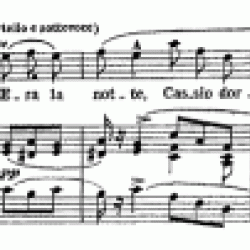
First performance of Verdi's Otello in Scotland
Posted 17 Nov 2012
Carl Rosa Opera gave the first Scottish performance in Glasgow's Theatre Royal on 15 November 1892.
According to the Evening Citizen the following day, it was an important event in Glasgow's musical history, even although the opera was now a few years old. The anonymous critic thought "some of the audience, no doubt, had heard it in Italy or London, but to the majority it must have been a complete novelty." He was particularly struck by musical effects in the fourth act: "the instrumental introduction with prominent parts for the wood winds, and especially the cor anglais, is a marvel of ingenious and effective construction, while Desdemona's sumptuous prayer, which follows, to the subdued accompaniment of muted strings, is not less touching and pathetic. "Mr Goossens secured an adequate representation of it, and with the exception of a stage wait, for which Miss de Lussan was responsible, the conductor received ample assistance from her and the rest of the cast."
Barton McGuckin, who had just rejoined the Rosa, won praise from the Evening Times critic. "In the concluding passages of his duet with Iago, he thrilled the audience by the force and intensity of his declamation." Vocally, Zélie de Lussan was all that could be required, but dramatically she displayed "a slight stiffness of manner which was noticeable in two or three of the scenes, and which will doubtless disappear after another rehearsal." Her conception of the part lacked a sense of gentleness and grace. However, she had cancelled performances the previous week, having caught cold on her trip to sing at Balmoral, so was perhaps not in her best form.
As for Alec Marsh as Iago, he won perhaps the highest praise. "Being in splendid voice, he sang with great expression and acted with becoming restraint." Alec Marsh sang his music admirably, his articulation was exceptionally clear, and his grasp of the character and its subtleties showed considerable insight. By contrast the Glasgow Herald critic thought McGuckin overtaxed his voice and there was a tendency to nasal intonation.
The translator was Dr Hueffer who himself had written libretti (including that for Colomba with Alexander Mackenzie) and produced a number of translations into English. For Otello, Hueffer was said to have turned back to Shakespeare's words as far as possible.
The company went on to Edinburgh, where the production was again given only one performance, something that the Scotsman critic found regrettable as "only a fraction of its beauties can be appreciated at a first hearing." He also stated, "As in all the recent productions of the Carl Rosa Company, no trouble or expense has been spared to give the opera all the advantage of a magnificent stage setting." This included obtaining copies of the original sets and costumes from La Scala.
Check out the full cast for Otello (1892).
Archive
2025
December
2024
November
March
2023
November
March
January
2022
August
July
2019
October
2018
September
February
2017
November
2016
November
October
September
May
March
February
2015
December
October
September
March
2014
October
March
2013
November
February
2011
December
November
September
August
June